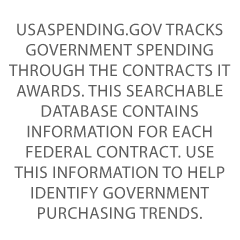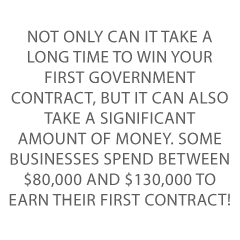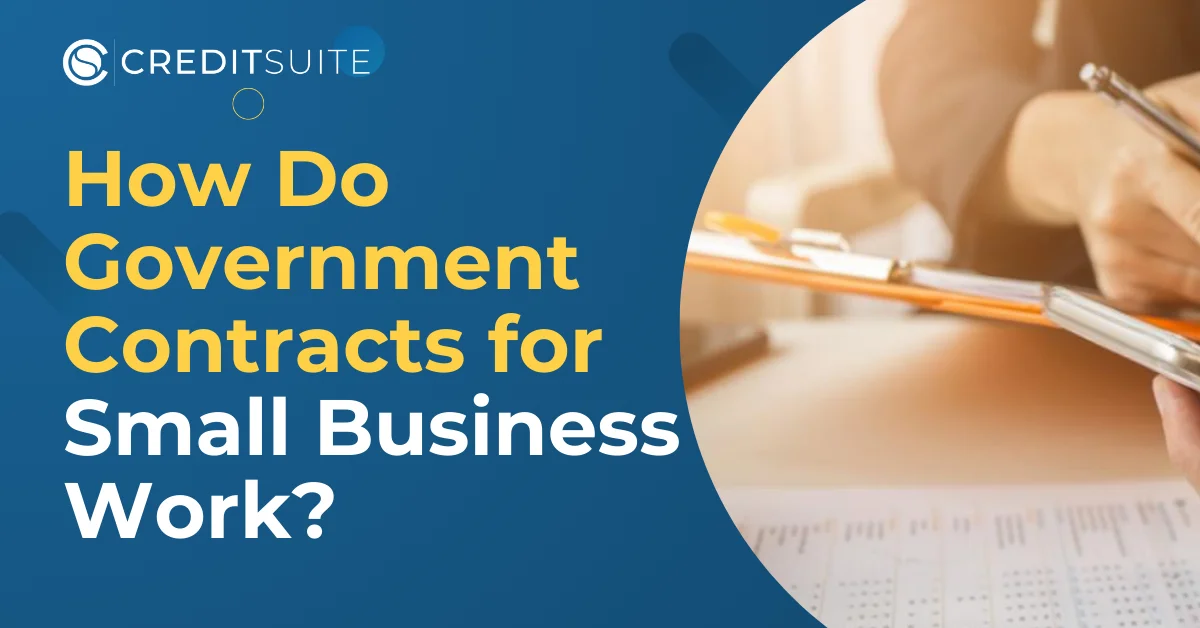Get Government Contracts for Small Business
Are you looking for government contracts for small business? The federal government can be a terrific place to get clients. But there are many details to learn! The Small Business Administration has got you covered.
Government Contracting
The government is a huge consumer of goods and services. So any US business should be trying to get a supply contract with them. Unlike other customers, the government will be a consumer for as long as the United States exists. The SBA Contracting Guide helps small businesses navigate the details.
SBA Contracting Guide
The SBA has a role in government contracting. They work with federal agencies and offer what are essentially SBA contracting assistance programs. The idea is to award 23% of prime government contract dollars to eligible small businesses. It also offers counseling and help to small business contractors.
Government contracts are a tremendous financial opportunity for small businesses. Per the SBA Contracting Guide, the US government buys all types of products and services. And the law requires it to consider buying from small businesses.
The government wants to buy from small businesses for several reasons, including:
- They want to ensure that large businesses don’t muscle out small businesses
- To gain access to the new ideas that small businesses provide
- To support small businesses as engines of economic development and job creation
- And to offer opportunities to disadvantaged socio-economic groups
How Do Government Contracts Work?
- Requesting proposals, evaluating bids, and awarding contracts should be on a level playing field
- The government should consider a bid from any qualified business
- With set-aside and sole-source contracts, federal agencies must publicly list their contract opportunities
- Some of these contracts are set aside only for small businesses
At times, set-aside contracts might make up certain types of tasks on larger contracts. In others, entire contracts may be reserved for small businesses. When a contract is set aside for one specific small business, it’s called a sole-source contract.
Does Your Business Have What it Takes to Get Government Contracts for Small Business?
Start with market research. To bid on and win government contracts, you must sell products or services the government buys. And you must do so at a competitive price. Check to see if there’s a market for your product or service. The SBA can help you to determine how big the market is, and find potential buyers.
The Federal Procurement Data System
Move onto the Federal Procurement Data System. This system is the repository of all federal contracting data for contracts over $25,000. With this system, you can see which agencies have contracts and with whom. Find out what agencies buy, and learn which contractors have contracts.
USSpending.gov
 Take a look at USASpending.gov. USASpending.gov tracks government spending through the contracts it awards. This searchable database contains information for each federal contract. Use this information to help identify government purchasing trends.
Take a look at USASpending.gov. USASpending.gov tracks government spending through the contracts it awards. This searchable database contains information for each federal contract. Use this information to help identify government purchasing trends.
Agency Recurring Procurement Forecasts
Federal agency procurement forecasts can be very helpful. Each government agency releases a procurement forecast. It includes contracting opportunities for small businesses. Review Agency Recurring Procurement Forecasts. Find out if there are agencies that are buying what you sell.
Procurement forecasts can get granular. You can look up procurement for (for example) the Department of Veterans Affairs. And then break it down by location. And then see budgeted amounts for everything from asbestos abatement to buying stretchers.
What Makes a Successful Contractor?
The government prefers to work with established, reliable businesses. This means it’s likely that startups need not apply. Do you have a track record of delivering quality goods and services on time and within budget? Is your reputation within your industry strong?
Downsides of Trying to Get Government Contracts for Small Business
It take a long time to win your first government contract. And it can also take a significant amount of money. Some businesses spend between $80,000 and $130,000 to earn their first contract! Also, it could take up to two years to start making a return on your investment. So you must have enough cash flow to sustain your business. 
Keep a diverse list of private-sector clients. This can help offset any potential initial losses. Being e-commerce savvy is also very important in government contracting. For example, to work with the Department of Defense, you must be able to invoice and receive payments electronically.
The SBA Offers Counseling to Small Businesses
One form of this help comes from a government contracts website called Procurement Center Representatives. Procurement Center Representatives (PCRs) help small businesses win federal contracts. PCRs view many federal acquisition and procurement strategies before they’re announced. This way, they can influence opportunities that should be set aside for small businesses. PCRs also conduct market research and help small businesses with payment issues. They also provide counseling on the contracting process.
Subcontracting Program Assistance (SPA)
SBA Learning Center
You can also check out the SBA Learning Center. The SBA offers free online courses. These are to help small businesses understand government contracting. These are in the form of video classes.
Procurement Technical Assistance Centers (PTACs)
Or work with Procurement Technical Assistance Centers. PTACs help small businesses interested in government contracting. PTACs can help you determine if your business is ready for government contracting. They can help you register in the proper databases. And they can help you to find and bid on contracts.
SCORE
Another option is working with SCORE. SCORE is a nonprofit association. It has thousands of volunteer business counselors around the country. These counselors educate small business owners. SCORE provides free in-person and online counseling. They also provide educational workshops.
Small Business Development Centers
Or try the SBA’s Small Business Development Centers. Small Business Development Centers (SBDCs) offer free, one-on-one counseling and low-cost training services. Business owners can go to SBDCs for help with procurement and contracting. SBDCs will also help with market research. And they will provide 8(a) program support for minority-owned businesses
SBA Small Business Offices
Or you can turn to the SBA’s small business offices. Many federal agencies have an Office of Small and Disadvantaged Business Utilization (OSDBU). Or they may have an Office of Small Business Programs (OSBP). These offices work to identify opportunities to contract with small businesses.
OSDBUs and OSBPs
An OSDBU promotes using certain kinds of small businesses. These include disadvantaged, 8(a), women-owned, veteran-owned, service-disabled veteran-owned, and HUBZone small businesses. This is within the US Department of Commerce’s (DOC) acquisition process.
OSBPs advocate to include small businesses in the cleared industrial base. They do so through education and collaboration. They also maximize opportunity for small businesses in DCSA acquisitions. DCSA stands for Defense Counterintelligence and Security Agency.
Basic Requirements for Getting Government Contracts for Small Business
Before a business can engage in federal contracting, they must meet certain basic minimum requirements. Your business must have a D-U-N-S number. It also needs an NAICS code.
You must also meet size standards. Most manufacturing companies must have 500 employees or fewer. Most non-manufacturing businesses with average annual receipts under $7.5 million will qualify. You’ll need to register with SAM (the System for Award Management). SAM is a database that government agencies search to find contractors. And you must maintain compliance. The federal government’s purchasing process comes under the Federal Acquisition Regulation.
Federal Acquisition Regulations
Note: Federal Acquisition Regulations allow for some deviance from the norm. Regulations covering government contracting programs for small businesses are in 13 CFR 125. This rule defines when a business can say one or more service-disabled veterans own it. It also includes the government definition of subcontracting.
How to Win Contracts
You want to find contracts – use databases like the Dynamic Small Business Search. And you must market to the government. Some great places to find out what agencies or prime contractors need are:
- Federal Procurement Data System
- Office of Small and Disadvantaged Business Utilization (OSDBU) (specific to some agencies)
- Office of Small Business Programs (OSBP) (specific to some agencies)
You also want to address any objections that may arise. A federal contracting officer may reject a business due to questions about ability to fulfill the contract. Then the SBA offers the small business a chance to apply for a Certificate of Competency. Here, you can prove your business is up to the challenge. But note: a COC is only good for one contract. So you may need to reapply in the future if you bid for another government contract in the future.
Types of Contracts
The government limits competition for certain contracts to small businesses. Those contracts are called small business set-asides. Set-asides can be competitive or sole-source. These can be some of the easiest government contracts to win.
Competitive Set-Asides
If 2+ small businesses could do the work or provide the products, the government sets aside the contract just for small businesses. Much of the time, this is automatic for government contracts under $150,000. Also, some set-asides are open only to small businesses in SBA contracting assistance programs.
Sole-Source Set-Asides
The government issues some contracts without a competitive bidding process. This often happens when only one business can fulfill the requirements of a contract. For consideration, register your business with the System for Award Management. And take part in any contracting program you may qualify for. Such as 8(a) Business Development or Women-Owned Small Business.
Government Contracts for Small Business: Takeaways
The US government is a huge consumer of goods and services. They are a client likely to be able to pay your business on time, and unlikely to go out of business in your lifetime. The SBA gives extensive guidance for getting government contracts for small business. Also, check if you or your business qualify for special programs to help you win government contracts.

